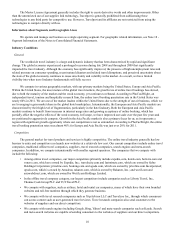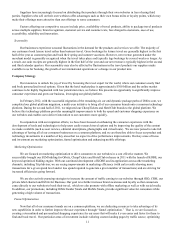Orbitz 2011 Annual Report Download - page 20
Download and view the complete annual report
Please find page 20 of the 2011 Orbitz annual report below. You can navigate through the pages in the report by either clicking on the pages listed below, or by using the keyword search tool below to find specific information within the annual report.20
operations could be negatively affected if competitive dynamics in the industry caused us to further reduce or eliminate the
service fees we charge our customers. If we are unable to implement changes to our business in an effort to absorb the impact
of the reduction or elimination of these fees or are unable to increase revenue from other sources, our business, financial
condition and results of operations would suffer.
Search and meta-search sites have also grown in popularity and may drive more traffic directly to the websites of
suppliers or competitors. Google appears to have increased its focus on appealing to travel customers through its launch of
Google Places and Google Flights. In addition, Google's efforts around Google Places could lead to it favoring Google Places
or a favored partner over and above our pages, which could undermine our ability to obtain prominent placement in paid or
unpaid search results at a reasonable cost, or at all. Google Flights is an air travel specific website that promotes air suppliers'
sites and not those of OTCs. If large search engines gain popularity with their meta-search models, customers could visit search
sites instead of ours and we may be required to pay for traffic that otherwise would have been free.
In addition, we currently license our search functionality, QPX Software, from ITA Software, Inc. The acquisition of ITA
Software, Inc. (“ITA”) by Google could result in ITA developing new software or other products in the future that it may not
make available to us, which could put us at a competitive disadvantage.
Certain of our international subsidiaries have a history of significant operating losses, and our inability to improve their
scale and profitability could adversely affect our business and results of operations.
We have historically incurred significant operating losses at our international subsidiaries and may continue to
experience operating losses in the future, particularly since we expect to continue to incur high levels of marketing and other
expenses in order to expand our international operations. As a result, we have made, and may continue to make, significant
investments in our international operations by using a portion of the cash flow generated from our domestic operations or
making borrowings under our revolving credit facility. There can be no assurance that our international subsidiaries will be
profitable in the future or that any profits generated by them will be sufficient to recover our investments in them.
The profitability of our international subsidiaries depends to a large extent on the scale of their operations. If we fail to
achieve the desired scale, we may not be able to effectively compete in the global marketplace and our business and results of
operations may be adversely affected.
Our international operations are subject to additional risks not encountered when doing business in the United States,
including foreign exchange risk, and our exposure to these risks will increase as we expand our international operations.
With employees in over 25 countries outside the United States, we generated 29% of our net revenue for the year ended
December 31, 2011 from our international operations. We are subject to certain risks as a result of having international
operations and from having operations in multiple countries generally, including:
• difficulties in staffing and managing operations due to distance, time zones, language and cultural differences,
including issues associated with establishing management infrastructure in various countries;
• differences and unexpected changes in local regulatory requirements and exposure to local economic conditions;
• limits on our ability to enforce our intellectual property rights and increased risk of piracy;
• preference of local populations for local providers;
• restrictions on the repatriation of non-U.S. investments and earnings back to the United States, including withholding
taxes imposed by certain foreign jurisdictions;
• diminished ability to legally enforce our contractual rights; and
• currency exchange rate fluctuations.
To the extent we are not able to effectively mitigate or eliminate these risks, our results of operations could be adversely
affected.
Further, our international operations require us to comply with a number of U.S. and international regulations, including,
among others, the Foreign Corrupt Practices Act (“FCPA”). Any failure by us to adopt appropriate compliance procedures to
ensure that our employees and agents comply with the FCPA and applicable laws and regulations in foreign jurisdictions could
result in substantial penalties or restrictions on our ability to conduct business in certain foreign jurisdictions.
























